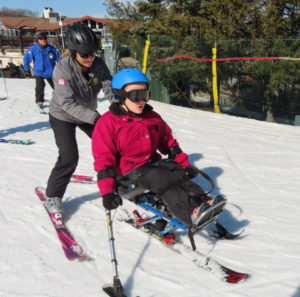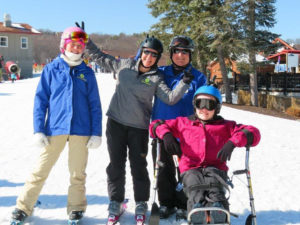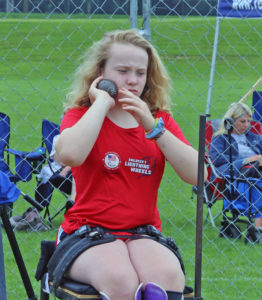One glance at her schedule of classes and activities, and it may seem that 16-year-old Sarah Maher of Westfield, N.J., uses a pair of skis to power her everyday life.
Look closer, and you will find that the Oak Knoll School sophomore’s favorite hobby requires her to sit in a single ski, called a monoski, but on which, she moves as fast as her older brother, Aidan, and sister, Caroline, do using two traditional skis.
“I loved the exhilaration the most,” she said about learning to ski in the Winter Park Adaptive Ski Program during a trip to Colorado with her family.
Maher was born with spina bifida that affects much of her lower body and walks using crutches and braces.
“At one point, we had her at the top of the mountain with all of us, and I realized that skiing together could actually happen,” said Maher’s mom, Karen. “Ten years later, she is completely capable of doing it.”
Today, she takes yearly lessons with the Pennsylvania Center for Adapted Sports (PCAS) programs at Camelback Mountain Resort in Tannersville, Pa. Although Maher admits that skiing is scary, she loves trying new things.
“Going fast down the hill, I experience a lot of adrenaline,” Maher said. “Also, my instructor said I am good at it, so that is reassuring.”

Nuts & Bolts
In Paralympic skiing, there are three categories in each snow event – one for visual impairments and two (standing and sitting) for physical disabilities. A standing race is on one ski, or two if the skier is using prosthetics. Sit-skiers use a molded seat placed on two narrow skis for cross-country or one wide ski for downhill, and they hold a set of outriggers.
Maher tried a variety of models, but standing put too much pressure on her knees. She also had to be tethered or pushed, meaning an instructor skis behind the athlete to help him or her control speed.
“I enjoyed it, but it limited my independence,” she said. “Until I switched to using a monoski, I had to be tethered. The monoski is more responsive to my actions. The hardest part is adjusting my balance.”
Maher said transitioning from having help to skiing downhill on her own was nerve-racking. She would get worried when an instructor let go of the tether, but learning the different feel was worth it to advance her skills.
“Now, I’m a fully independent skier and even allowed to use the chairlift,” she said.
Maher said to get onto the monoski, she first flips a switch to push the two outriggers up into a higher position.
“There’s a safety strap, and before you get out on the other side of the lift, you have to flip the switch again to be able to then throw yourself forward onto the ski.”
She said it’s cool that her instructors use monoskis, too.
Due to the novel coronavirus (COVID-19) pandemic, skiing is the only program PCAS is offering from Jan. 2 to March 13. Judy Morrison is the program’s director and has been teaching adaptive skiing since 1994.
“Sarah is a blast to ski with,” she said.
Morrison said the Camelback program is one of two in the Pocono Mountains that offer private lessons to people with disabilities.
“During the snowy months, people have a hard time finding outdoor activities, and we hope to welcome new students again next year,” she said.

Freedom Through Fear
Besides skiing, Maher swims on her high school varsity and club teams, and she participates in swimming and in multiple track and field events with the Children’s Lightning Wheels, a Paralympic Sports Club sponsored by Children’s Specialized Hospital.
Maher has competed at Move United (formerly Adaptive Sports USA) Junior Nationals in track and field since she was 5 and swimming since she was 7. She tried soccer, softball and ballet but chose wheelchair racing from an early age. She was part of the inaugural New York Road Runners’ 5th Avenue Mile for junior wheelchair racers in 2016 and last summer, her Junior Nationals team took second place overall.

Maher said Junior Nationals is where she made friends with differing abilities.
“I don’t over-think about my disability,” Maher said. “I have learned that everyone is making the best of their situation. I hope if I try my best, people learn the same thing from me.”
Skiing is just a hobby for Maher while she focuses on track and swimming, but she says it tests her mental strength.
“I get anxious when I ski because I can’t control the conditions or other skiers,” she said. “Through skiing, I’ve learned what I can control, so the fear aspect makes it more fun.”
She also said swimming on her high school team has taught her how to problem solve and be her own advocate because her coaches don’t always know how to help her.
While she would love to ski out West again, her next goal is to make Team USA Emerging Team standards.
“I only have so many muscles that work in my body, so sometimes I have to reset my muscle memory, but each sport helps with the others I’m doing,” she said.
Before you call her an all-season athlete, though, Maher said, “I think snow is pretty, but it’s hard for me to walk in, so I really don’t like winter other than skiing and hot chocolate.”
She said she would tell other potential adaptive skiers to just have fun with it.
“I get nervous, but once I get into a groove, it’s easier,” she said. “You can’t stress about what’s going to happen, like when a person falls and you have to go around them. You have to take things as they come. I just like doing things I’m good at, and I should probably take my own advice.”
Contact Judy Morrison, Program Director, Pennsylvania Center for Adapted Sports at: Judy.morrison@centeronline.com if you’d like to join its virtual programming during the COVID-19 pandemic.
Indoor Rowing: 5:30-6:45 p.m. Monday-Thursday. Rowing experience and ergometer required.
Standing Fitness: 5 p.m. Tuesdays. Balance, endurance, strength and cardio exercises.
Adaptive Yoga: 3:30-4:45 p.m. Wednesdays. Learn poses in standing, seated and lying down positions.
Seated Fitness: 5 p.m. Thursdays. Arm/trunk workouts for strength, stretch and balance.
Movie Club: 7 p.m. Jan. 14. Discuss The Theory of Everything.
All times are Eastern Standard Time.